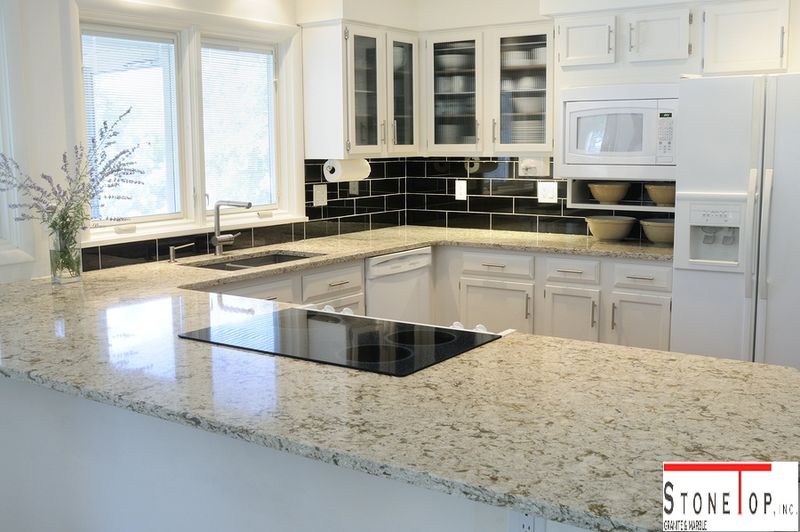Cleaning quartz countertops doesn’t have to be rocket science, but some people try to use a variety of different chemicals and cleaning agents to get the job done, including using acetone on quartz – but is this a good idea?
You should avoid using acetone on quartz because it can damage the seal, as well as the resin that binds the quartz material together. Some alternatives include dish soap and warm water, as well as quartz-specific cleaning products.
In the rest of this article we will take a deep dive into why you should avoid using acetone on quartz, and what some alternatives are so that you can still keep your countertop looking clean and fresh.
Why You Shouldn’t Use Acetone On Quartz
Quartz is made from quartz crystals that are bonded together with resin, pigments and other materials like glass.
The surface is then usually coated with a sealing agent that protects the quartz below from spills and stains. If you use acetone on quartz, it will react with the seal and remove it.
The acetone will then react with the quartz below and create marks that, although not noticeable in darker light, can be seen when light is reflected off the surface or on certain angles. If you’ve ever noticed the marks that acetone can leave behind on hardwood floors you will understand how frustrating these marks can be to deal with.
This is why you shouldn’t use acetone on quartz, but what happens if you accidentally get some onto the surface anyway?
How To Remove Acetone From Quartz
If you’ve used acetone on quartz by mistake then the best thing you can do is remove it as quickly as possible.
To do this, take a clean dishcloth and wring it out in some warm water and soap. Rinse the area where the acetone was spilt and work from the outside towards the center of the spill until it has been removed, not forgetting to rinse the dishcloth out regularly in the soap and water solution.
If you manage to remove the acetone quickly you will likely prevent any damage to the quartz, but if the acetone has sat for a couple of minutes or more then the damage may already be done.
Can Acetone Damage On Quartz Be Reversed?
If you have damaged quartz from using acetone it is very difficult to reverse.
This is because the acetone will damage not only the seal but also the resin below that binds the quartz together. The best option, in this case, is to contact the manufacturer and see what the recommended course of action is.
In some cases, the seal can be re-applied if the damage is not extensive. In other cases, the countertop may have to be replaced entirely, but it depends on the manufacturer and what they recommend.
Alternatives To Acetone For Quartz
The best options for cleaning quartz are actually some of the most simple, so let’s take a look at some.
pH Dish Soap And Warm Water
Using a neutral dish soap mixed with warm water is the most recommended method for cleaning quartz, and for good reason.
Not only is this method convenient, but it also doesn’t cause any damage to the quartz whatsoever. All you need to do is take a clean dishcloth and a solution of warm water with a few drops of pH-neutral dish soap added and you are ready to go.
The only thing to be careful with is leaving soap residue behind on the surface. It won’t leave anything permanent, but you will notice the streaks – especially during the daytime when light hits the quartz.
Quartz-Specific Cleaning Products
Another safe option is using quartz cleaning products.
There are lots of these on the market, but if you are unsure then get into contact with the manufacturer to see what they recommend. Not all quartz countertops are sealed, and those that are can be sealed with different chemicals, so if you are not sure then get some professional advice.
Rubbing Alcohol
Despite the common opinion that rubbing alcohol and acetone are the same thing; they are absolutely not, and rubbing alcohol can be safely used on quartz.
Mix 3 parts dish soap with one part rubbing alcohol in warm water and you’ll have a handy DIY cleaning solution that you can use on quartz without worrying about damaging the surface.
What About Hydrogen Peroxide?
Hydrogen peroxide can technically be used to clean quartz, but we generally don’t recommend it unless you have no other option.
This is because to make hydrogen peroxide safe for use on quartz countertops it needs to be diluted, however, this reduces its effectiveness which defeats the point of using it in the first place.
Can I Use Nail Polish Remover On Quartz?
Nail polish removers contain acetone as the solvent and therefore you should try to avoid using them – or spilling them – on quartz wherever possible.
Final Thoughts
You should really avoid using acetone on quartz wherever possible and opt instead for one of our suggested alternatives such as dish soap and water to keep your countertops looking fresh.
